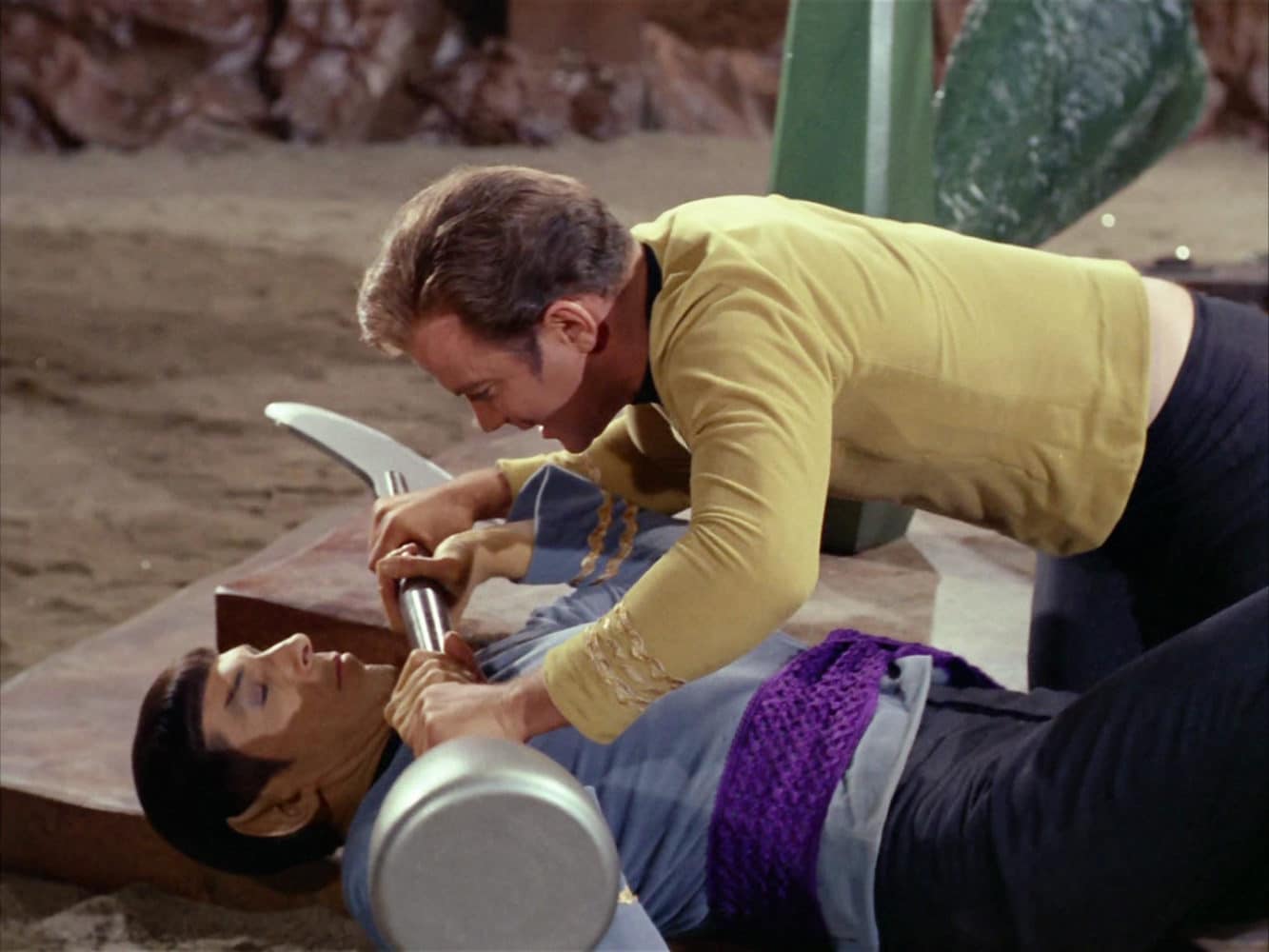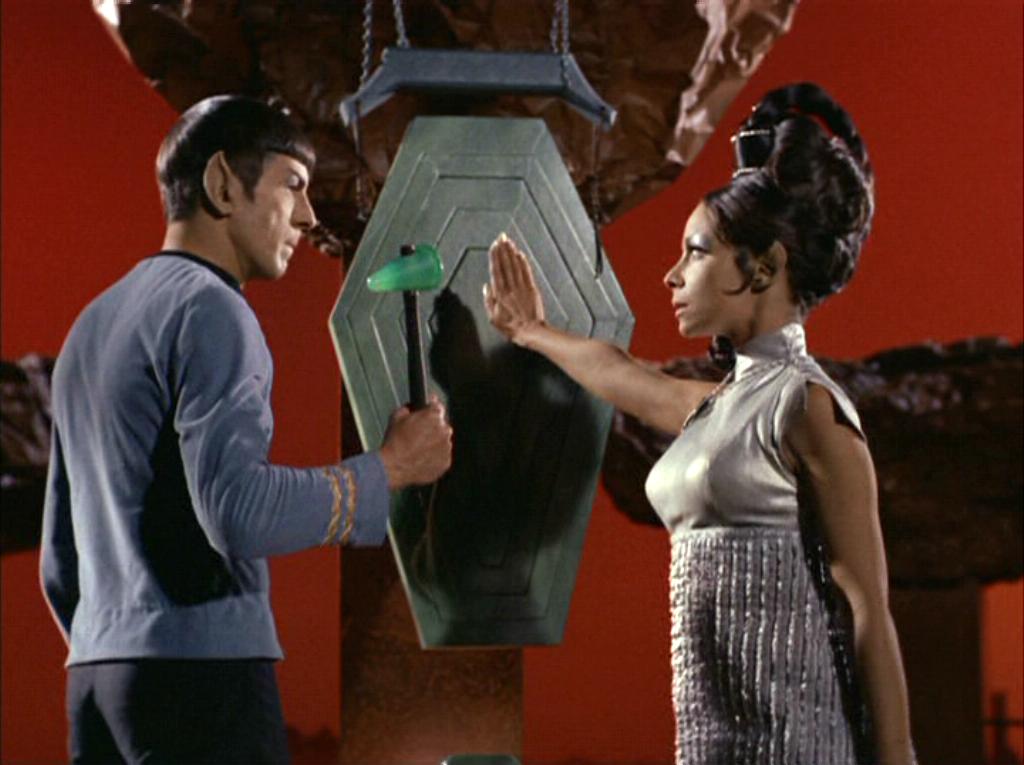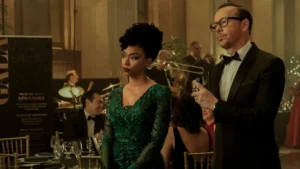Theodore Sturgeon’s Amok Time kicks off season two of Star Trek: The Original Series with a bang. Because of Spock’s immense popularity, season two begins with a story dedicated solely to him. He’s going through pon farr, the Vulcan period of mating, and he must return home to get married. Unfortunately, his wife-to-be, T’Pring, wants to marry someone else, so Spock must battle to the death. This aired on September 15, 1967, starring William Shatner, Leonard Nimoy, and DeForest Kelley.
Despite being under threat of cancellation from NBC, Star Trek season two starts off with a bang. Season one spent a good deal of time setting up the universe; telling stories that demonstrated the idealism that Gene Roddenberry was shooting for; and establishing the triumvirate of Kirk, Spock, and McCoy. Season two deepens those relationships and lets the audience really settle in with them, and gives us some even better, more focused science fiction. The Enterprise gains a new bridge officer in Pavel Chekov (Walter Koenig), and we’ll also see an expansion of minor roles, especially Scotty, but Uhura will get a tad more to do. It also gives us some pretty bad episodes, but nothing is as weak as season one’s “The Alternative Factor.” In fact, it’s entirely possible that no other episode of Star Trek: The Original Series did more to expand the Star Trek universe than Amok Time.

As we’ve seen before, quite often in Star Trek, when the plot is simple and straightforward, we get the strongest, most character-driven episodes. And this is utterly character-driven. This is the first episode in which we see the Vulcan salute and hear the words “Live Long and Prosper,” the first time we meet other Vulcans, let alone visit planet Vulcan itself. And not only do we visit Vulcan and meet other Vulcans, but we delve deep into a disturbing aspect of Vulcanian culture: a mating drive called pon farr, followed by arranged marriage with a fight to the death (koon-ut-kal-if-fee) being the only way out.
Science fiction and fantasy tend toward monolithic cultures with no differentiation or disparity within them. All Jawas are sneaky traders, every Fremen is xenophobic, all xenomorphs just want to kill indiscriminately. At first, Vulcan seems to be the same. It is supposed to be one of the most enlightened worlds in the galaxy. They’ve suppressed barbaric emotions in favor of governing their minds and selves with total logic, and yet they’re still a deeply traditional people. The arranged marriage aspect is more than a bit bothersome, not because of the arrangement itself, but because, as T’Pau (the Vulcan leader, played by Celia Lovsky) points out, the wife becomes the property of her husband, and there’s a fight to the death to get out of it. There’s this small corner of their enlightened culture that still retains some barbarism. And that makes them significantly more three dimensional.

What complicates things, even more, is that T’Pring (Arlene Martel) doesn’t want her intended, Stonn, to die in the battle with Spock. She can choose another champion, and she chooses Kirk. And so, Kirk must fight his best friend to the death, otherwise Spock will die anyway. For a show in the 1960s, the fight is choreographed really well, with the two men fighting with different styles. Kirk’s human ingenuity and lack of a need to follow tradition means that he can fight dirty. He fakes his death so that Spock looks like a victor and gets out of the situation. He chooses not to mate with T’Pring, freeing him to return to the Enterprise. And finally, when Spock discovers that Kirk isn’t actually dead, his emotions actually do burst forth–cathartically, for the audience.
Random Thoughts
It’s more than a little strange that Spock’s parents aren’t present at this ceremony. About halfway through season two, we’ll meet them anyway, but when the son of one of Vulcan’s most prominent citizens is ready to get married or die, you’d think that Ambassador Sarek or his human wife (burdened by all those pesky emotions) would demand to be present.
Vulcan is enormously prominent throughout the rest of the franchise, not only because we’ll have more Vulcans in starring and guest starring roles, but also because that race plays a prominent role in the founding of the Federation (Star Trek: Enterprise) and in the Klingon War (Star Trek: Discovery). Amok Time also inspired countless tie-in novels, most significantly Spock’s World by Diane Duane, which is almost Dune-like in its depth and exploration of the Vulcan culture.
The fight music in Amok Time is iconic! It’ll be reused throughout the series.
Kirk’s ripped shirt: check!
Memorable Quotes
“After a time, you may find that having is not so pleasing a thing after all as wanting. It is not logical, but it is often true.”
– Spock’s advice to Stonn and T’Pring
T’Pau: “Live long and prosper, Spock.”
Spock: “I shall do neither. I have killed my captain and my friend.”
– Man… the number of times Sarek’s children have betrayed their commanding officers… they need to take a hard look at their upbringing.



